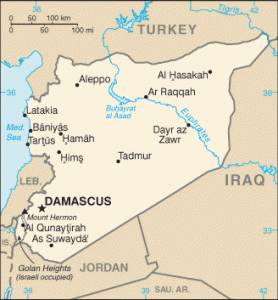After successive high-profile attacks by the Syrian rebel militias this week, some are claiming they are increasing in effectiveness. But the opposition is still an unorganized mess, its just that now the arms they’re receiving are facilitating more carnage.
 The rebels on Thursday bombed the Palace of Justice as well as a police station in downtown Damascus. The day before, militias attacked a pro-Assad television station, killing a number of civilians. And late on Monday, the so-called Free Syrian Army bombed the barracks of the Republican Guard close to the palace of President Bashar al-Assad.
The rebels on Thursday bombed the Palace of Justice as well as a police station in downtown Damascus. The day before, militias attacked a pro-Assad television station, killing a number of civilians. And late on Monday, the so-called Free Syrian Army bombed the barracks of the Republican Guard close to the palace of President Bashar al-Assad.
The opposition is still a disparate, rag tag group of localized militias with conflicting agendas and many of whom are Sunni extremists or have ties to al-Qaeda. They are increasingly to blame for massacres of civilians as well. Nothing has changed, except that the weapons being funneled to them by the US, European Union, Turkey, and the Gulf Arab states are being put to use.
But none of this bodes well for an end to violence in the country. Foreign meddling on behalf of all sides in Syria has been instrumental in prolonging the conflict by emboldening both sides and making a political settlement more remote.
“The intensity of the divisions in the country, the external environment in which sides are providing arms to both of the contending parties—all of that suggests that the situation’s going to continue to deteriorate,” James Dobbins, director of the RAND International Security and Defense Policy Center and a former US assistant secretary of state, told NPR.
UN envoy Kofi Annan has put together a meeting, which will take place in Geneva on Saturday, to work with the regional players to find a way to stop the bloodshed in Syria. But the only way Russia would agree to drop its support of Assad and oversee any kind of partial regime change is if they could be assured that Washington and its allies would not try to exploit a political transition for their own interests, which is virtually an impossibility.


